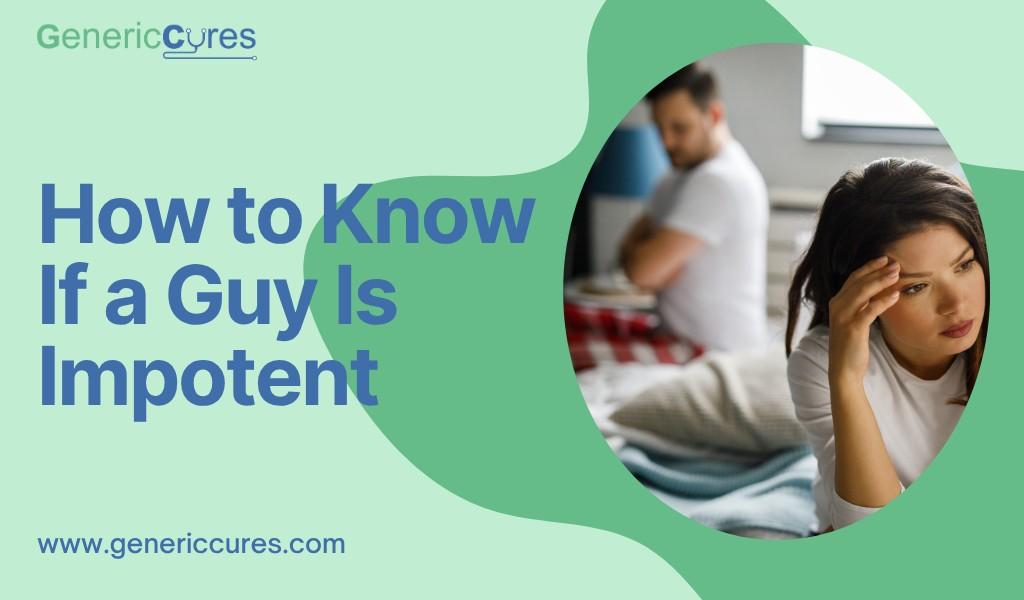


Understanding whether a man is impotent requires sensitivity, awareness, and support.
Impotence, also known as Erectile Dysfunction (ED), affects millions of men globally and can deeply impact confidence, relationships, and emotional well-being.
Impotence, or Erectile Dysfunction, is the inability to get or maintain an erection firm enough for sexual intercourse. While it’s normal for men to occasionally experience difficulty with erections, persistent or frequent issues may indicate a deeper health concern.
ED isn’t a disease itself but a symptom of underlying physical or psychological conditions, and recognizing it early allows for better treatment outcomes.
The following signs may indicate that a man is experiencing impotence:
If a man frequently struggles to get an erection despite feeling aroused, this can be a red flag. An occasional issue may be due to stress or fatigue, but persistent trouble is often a sign of ED.
Another common symptom is being able to achieve an erection, but not being able to maintain it through the course of sexual activity.
A decline in libido can be linked to hormonal imbalances, stress, or depression, which may also contribute to ED. If sexual interest diminishes significantly, it could be related to a larger problem.
Premature ejaculation, delayed ejaculation, or complete inability to ejaculate may accompany ED. These signs might indicate broader sexual health problems that include impotence.
Impotence often stems from physical health issues, including:
Heart disease
High blood pressure
Diabetes
Obesity
High cholesterol
Hormonal imbalances (low testosterone)
Chronic kidney or liver conditions
Peyronie’s disease (penile curvature)
Medications used to treat these illnesses can also lead to erectile difficulties. For example, drugs used to manage depression or hypertension are known contributors to ED.
Mental and emotional health plays a critical role in sexual function. Impotence can be triggered by:
Stress or anxiety
Relationship problems
Low self-esteem
Depression
Trauma or sexual abuse history
Performance anxiety—a fear of not performing well in bed—can become a self-fulfilling prophecy, contributing further to the problem.
If you’re in a relationship and suspect your partner might be struggling with ED, approach the topic compassionately and without judgment. Avoid blaming or pressuring, as this can worsen anxiety.
Here are some ways to support your partner:
Start a calm, private conversation.
Emphasize that intimacy isn’t only about sex.
Suggest visiting a doctor together.
Offer to learn more about ED and treatment options.
To determine if a man is impotent, a healthcare provider may:
Ask about sexual and medical history
Conduct a physical examination
Order blood tests to assess hormones, cholesterol, and glucose
Perform a nocturnal penile tumescence (NPT) test to check for erections during sleep
Fortunately, ED is treatable in most cases. Medical solutions include:
Drugs like Sildenafil, Tadalafil, and Vardenafil are first-line treatments that enhance blood flow to the penis. One such medication is Cenforce professional 100 mg, which is known for its rapid absorption and effectiveness in achieving firm erections.
Some men respond better to combination treatments like Filagra DXT plus, which contains Sildenafil and Duloxetine. It not only supports better erections but also delays ejaculation.
Men who prefer an alternative to conventional pills can try chewables such as Vidalista CT, which are discreet and easy to take without water.
Quit smoking
Reduce alcohol intake
Manage stress through therapy or meditation
Engage in regular physical exercise
Eat a heart-healthy diet
These changes can significantly improve erectile function and overall health.
If the root of ED is psychological, therapy with a licensed counselor or sex therapist can help address emotional barriers and performance anxiety.
In many cases, impotence is reversible, especially when caused by stress, anxiety, or lifestyle habits. Even physical causes like high blood pressure or diabetes, when managed properly, can reduce or eliminate ED symptoms.
The earlier the condition is addressed, the more effective the treatment will be.
Understanding whether a man is impotent requires sensitivity, awareness, and support. While symptoms such as trouble achieving or maintaining an erection, reduced libido, or ejaculation problems may signal Erectile Dysfunction, only a medical diagnosis can confirm it.
And when it comes to purchasing safe, reliable ED medication, turn to trustworthy sources like Generic cures for peace of mind and results you can rely on.
